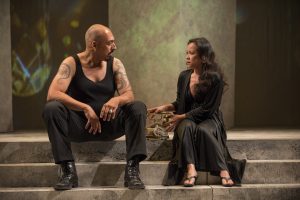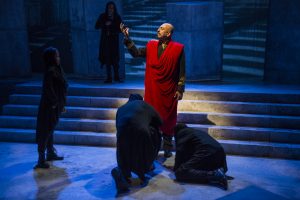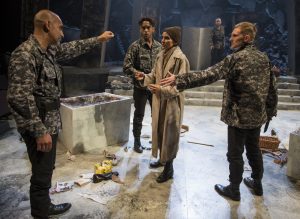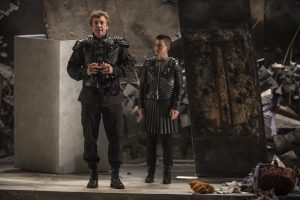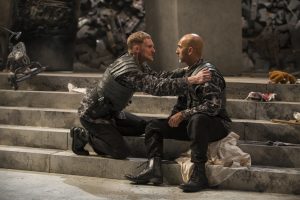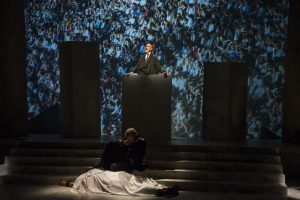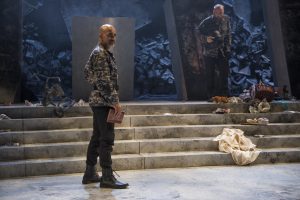MAKE ROME GREAT AGAIN
Julius Caesar: It’s a strong choice for an election year, a timely reminder of why we prefer peaceful changes of power to assassinations and their inevitable knee-jerk revenge. It’s unsurprising that Shakespeare’s most political play centers on a political murder, the ultimate act of censorship, whether done in togas or, as in Writers Theatre’s streamlined and kinetic update, modern dress. No hymn to democracy, Julius Caesar deplores the death of the title tyrant and the fickle loyalties of the mob who applaud his murderers.
However “honorable” seem chief conspirators Brutus and Cassius, they trigger doom beyond a dead general; they dare to substitute their narrow and self-serving vision of Rome’s well-being for Caesar’s benevolent concept of a greater good. Inevitably, reaching power by default, the assassins dissolve into petty squabbles. Other than survival, no grand vision holds them fast. The battle of Philippi only completes the damage inflicted by disunity.
Properly produced, Shakespeare’s shortest play feeds on its story like a firestorm, propelled by an unstoppable and inevitable chain of events. The only doubt is whether model-citizen Brutus will join a conspiracy whose murderous intent undermines not only his loyalty to Caesar but his principles. (He rightly fears, as we do still, what happens when events “disjoin remorse from power.”) We just await the battle’s reckoning.
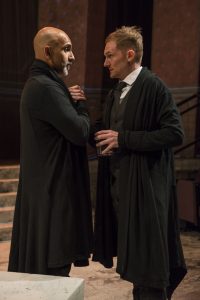 In 105 tensile minutes (no intermission to siphon momentum), this adaption, by Writers Theatre artistic director Michael Halberstam and longtime collaborator and co-director Scott Parkinson (who plays Cassius), delivers all the urgency the master could muster. With powerful projections on pylons, this Julius Caesar is total 2016. It’s about real disruption.
In 105 tensile minutes (no intermission to siphon momentum), this adaption, by Writers Theatre artistic director Michael Halberstam and longtime collaborator and co-director Scott Parkinson (who plays Cassius), delivers all the urgency the master could muster. With powerful projections on pylons, this Julius Caesar is total 2016. It’s about real disruption.
It’s also almost trivially trendy–to the point of depicting the changing texts sent during Mark Antony’s subversive funeral oration. But, more vital than virtual, our revival delivers constant shocks of recognition, thanks to a video backdrop by Mike Tutaj that ranges from caving icebergs to storms of shock and awe. And Writers’ amphitheater nicely concentrates the pell-mell action. Like Cassius, the production has a lean and hungry look. Even the eclecticism works: Borrowing from Kabuki tradition, Julius Caesar’s assassination is both stylized and graphic. Afterwards and in an instant, the stage is savaged, reduced to apocalyptic rubble à la Iraq.
As Caesar, Madrid St. Angelo makes a tempting target, larger and louder than life. His hubris, a bellicose reaction to the cautionary foresight of devoted wife Calphurnia (Christine Bunuan), is a classic case of pushing power into nemesis. Comparatively passive in his unassailable moral purity, Kareem Bandealy’s anguished Brutus strategically contrasts with Parkinson’s wheedling, nervous Cassius, a smooth salesman for civil strife. Their pre-battle quarrel and reconciliation verge on a hissy fit and a kissy reconciliation, exempla of just how great a leadership vacuum of Caesar’s demise opened up.
Attempting to fill that gap, Thomas Vincent Kelly’s bluntly sincere Antony seems less a crowd manipulator than a true believer in the greatness that was Caesar: His rousing of the rabble is a force of nature as much as artful propaganda. In sleek dissimilarity, Sydney Germaine’s young and epicene Octavius predicts the once and future, dividing-to-conquer Emperor Augustus. Pulsating with sound and fury signifying something, the crowd scenes look small, given a 9-person ensemble, but sound big: Here that’s everything.
This version begins and ends with the ensemble declaring its doubts and fears, confused and finally convulsed by carnage masked as change. With radicalism and tyranny seemily interchangeable, this W.T. reclamation shows history ever threatening a repeat engagement. Shakespeare knew every edge from which we fall.
photos by Michael Brosilow
poster photo by Saverio Truglia
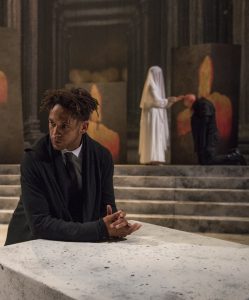 Julius Caesar
Julius Caesar
Writers Theatre
Alexandra C. and John D. Nichols Theatre
325 Tudor Court in Glencoe
ends on October 16, 2016
EXTENDED to October 23, 2016
for tickets, call 847.242.6000
or visit Writers Theatre
for more shows, visit Theatre in Chicago

